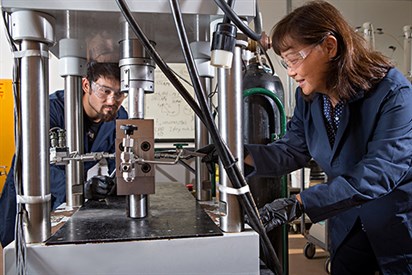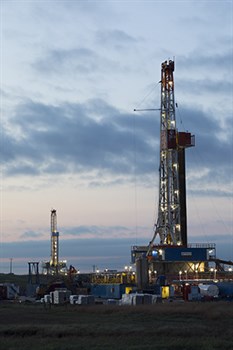Texas A&M Engineering Experiment Station and Marathon Oil Corporation have initiated an impressive research program to study advanced petroleum fluid flow processes and recovery techniques from unconventional resource plays in the U.S. The new research venture utilizes the work of professors from petroleum engineering, mechanical engineering and chemical engineering, as well as a team of Marathon Oil engineers, geologists and geophysicists. Information gained from the research will aid education for students and industry practices for recovering energy.

Dr. Ding Zhu (right) and master’s student Ryan Winner running a fracture conductivity experiment.
Dr. Dan Hill, current head of the Harold Vance Department of Petroleum Engineering at Texas A&M University, is the principal investigator of the program. Dr. Marcelo Laprea-Bigott, a professor of engineering practice in the department, will work with Hill as project manager.
“One thing that makes this a very unique research program is we are working very closely with Marathon Oil,” said Hill. “They will share current practices, seismic information, microseismic monitoring of fracturing, rock samples and well data. The benefits to the department are many. The more we learn, the more we can pass on to our students, graduates as well as undergraduates.”
Randy Johnson, Marathon Oil’s vice president of Integrated Performance, helped define the program and is on the program’s steering committee. Jude Nwaozo, a senior reservoir engineer at Marathon Oil, serves as program manager.
“At Marathon Oil, we’re actively pursuing advanced research and state-of-the-art techniques that will enhance well performance across our resource plays, and improve the understanding of fluid flow and geologic influences, particularly in emerging basins that are early in the development cycle,” said Johnson. “Texas A&M was selected because of their exemplary vision and capability to partner with us on this advanced technical research. Marathon Oil will provide subject matter experts from several disciplines to create a mutually beneficial knowledge sharing experience. This partnership will combine our practical work in the field with the talent and capabilities of this team from Texas A&M to study fluid flow and geologic influences in complex unconventional reservoirs.”

Total project funding includes $1.3 million per year from sources within TEES, Texas A&M and the petroleum engineering department. A significant portion of the funding will support 15 graduate students. Other research staff will also be needed, including two or three post-docs, one lab technician and a part-time administrative assistant.
The program’s scope is heavily tied to the research strengths of the engineering faculty at Texas A&M. The endeavor has been divided into a handful of main areas. Within each area are different projects headed by one or more faculty members who will guide graduate student researchers. Each of these projects will have a Marathon Oil representative assigned as the main liaison, or mentor, to ensure research focus and provide needed resources. Laprea-Bigott will coordinate meetings and foster communication among the project teams.
“I see this as a terrific model for future research direction,” said Hill, who will step down as department head in January. “We are excited and enthusiastic about getting started. We’re hitting the ground running.”